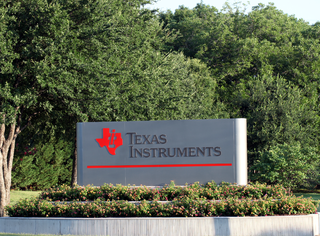
Texas Instruments Incorporated (TI) is an American semiconductor company headquartered in Dallas, Texas that designs and manufactures semiconductors and various integrated circuits. It is one of the top 10 semiconductor companies worldwide based on sales volume. The company's focus is on developing analog chips and embedded processors, which account for more than 80% of its revenue. TI also produces TI digital light processing technology and education technology products including calculators, microcontrollers, and multi-core processors. The company holds 45,000 patents worldwide as of 2016.

The TI-89 and the TI-89 Titanium are graphing calculators developed by Texas Instruments (TI). They are differentiated from most other TI graphing calculators by their computer algebra system, which allows symbolic manipulation of algebraic expressions—equations can be solved in terms of variables, whereas the TI-83/84 series can only give a numeric result.
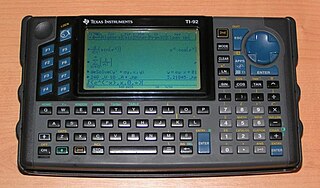
The TI-92 series are a line of graphing calculators produced by Texas Instruments. They include: the TI-92 (1995), the TI-92 II (1996), the TI-92 Plus and the Voyage 200 (2002). The design of these relatively large calculators includes a QWERTY keyboard. Because of this keyboard, it was given the status of a "computer" rather than "calculator" by American testing facilities and cannot be used on tests such as the SAT or AP Exams while the similar TI-89 can be.
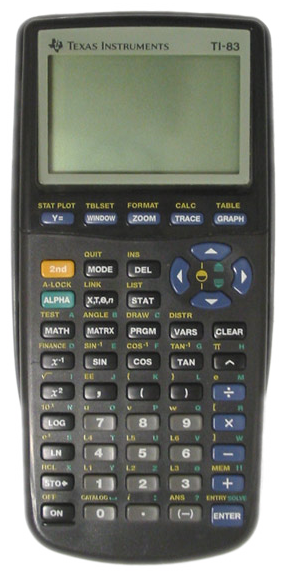
The TI-83 series is a series of graphing calculators manufactured by Texas Instruments.

A scientific calculator is an electronic calculator, either desktop or handheld, designed to perform calculations using basic and complex mathematical operations and functions. They have completely replaced slide rules as well as books of mathematical tables and are used in both educational and professional settings.

The Speak & Spell line is a series of electronic hand-held child computers by Texas Instruments that consisted of a TMC0280 linear predictive coding speech synthesizer, a keyboard, and a receptor slot to receive one of a collection of ROM game library modules. The first Speak & Spell was introduced at the summer Consumer Electronics Show in June 1978, making it one of the earliest handheld electronic devices with a visual display to use interchangeable game cartridges. The company Basic Fun brought back the classic Speak & Spell in 2019 with some minor changes.

The TI-84 Plus is a graphing calculator made by Texas Instruments which was released in early 2004. There is no original TI-84, only the TI-84 Plus, the TI-84 Plus Silver Edition models, and the TI-84 Plus CE. The TI-84 Plus is an enhanced version of the TI-83 Plus. The key-by-key correspondence is relatively the same, but the TI-84 features improved hardware. The archive (ROM) is about 3 times as large, and the CPU is about 2.5 times as fast. A USB port and built-in clock functionality were also added. The USB port on the TI-84 Plus series is USB On-The-Go compliant, similar to the next generation TI-Nspire calculator, which supports connecting to USB based data collection devices and probes, and supports device to device transfers over USB rather than over the serial link port.

The TI-81 was the first graphing calculator made by Texas Instruments. It was designed in 1990 for use in algebra and precalculus courses. Since its release, it has been superseded by a series of newer calculators: the TI-85, TI-82, TI-83, TI-86, TI-83 Plus, TI-83 Plus Silver Edition, TI-84 Plus, TI-84 Plus Silver Edition, TI-84 Plus C Silver Edition, TI-Nspire, TI-Nspire CAS, TI-84 Plus CE, and most recently, the TI-84 Plus CE Python. Most of them share the original feature set and 96×64-pixel display that began with this calculator, with the exceptions of the TI-84 Plus C Silver Edition and the TI-84 Plus CE family.
TI-BASIC is the official name of a BASIC-like language built into Texas Instruments (TI)'s graphing calculators. TI-BASIC is a language family of three different and incompatible versions, released on different products:

The TI-30 is a scientific calculator manufactured by Texas Instruments, the first model of which was introduced in 1976. While the original TI-30 was discontinued in 1983 after several design revisions, TI maintains the TI-30 designation as a branding for its low and mid-range scientific calculators.

The Texas Instruments LPC Speech Chips are a series of speech synthesizer digital signal processor integrated circuits created by Texas Instruments beginning in 1978. They continued to be developed and marketed for many years, though the speech department moved around several times within TI until finally dissolving in late 2001. The rights to the speech-specific subset of the MSP line, the last remaining line of TI speech products as of 2001, were sold to Sensory, Inc. in October 2001.
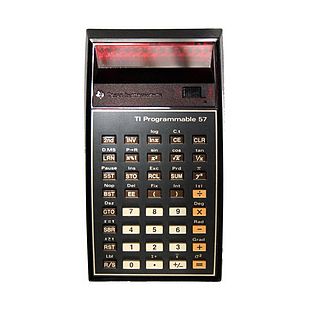
The TI-57 was a programmable calculator made by Texas Instruments between 1977 and 1982. There were three machines by this name made by TI, the first was the TI-57 with LED display released in September 1977 along the more powerful TI-58 and TI-59. It had 50 program steps and eight memory registers. Two later versions named TI-57 LCD and TI-57 LCD-II have a LCD display, but were less powerful and had much less memory: 48 bytes to be allocated between program 'steps' and storage registers.
Programmable calculators are calculators that can automatically carry out a sequence of operations under control of a stored program. Most are Turing complete, and, as such, are theoretically general-purpose computers. However, their user interfaces and programming environments are specifically tailored to make performing small-scale numerical computations convenient, rather than general-purpose use.
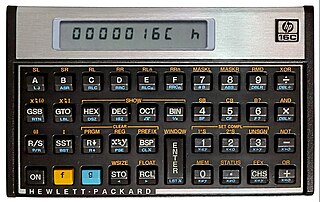
The HP-16C Computer Scientist is a programmable pocket calculator that was produced by Hewlett-Packard between 1982 and 1989. It was specifically designed for use by computer programmers, to assist in debugging. It is a member of the HP Voyager series of programmable calculators. It was the only programmer's calculator ever produced by HP, though many later HP calculators have incorporated most of the 16C's functions.

TIGCC is a software development environment which allows developers to program and compile A68K assembly, GNU assembly, and C code for the Motorola 68000 series Texas Instruments graphing calculators. TIGCC is licensed under the GNU General Public License.
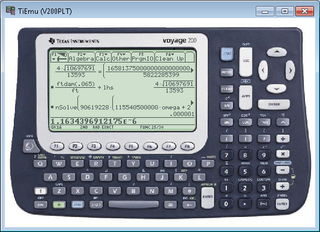
TiEmu is an emulator that works on many different operating systems like Linux/Unix, macOS, FreeBSD, Microsoft Windows and so on. It emulates the Motorola 68000 series Texas Instruments graphing calculators. TiEmu is licensed under the GPL.

The TI-Nspire is a graphing calculator line made by Texas Instruments, with the first version released on 25 September 2007. The calculators feature a non-QWERTY keyboard and a different key-by-key layout than Texas Instruments's previous flagship calculators such as the TI-89 series.

The Texas Instruments Business Analyst series is a product line of financial calculators introduced in 1976. BA calculators provide time value of money functions and are widely used in accounting and other financial applications. Though originally designed specifically for financial use, current models also include basic scientific calculator and statistics functions. The BA series competes directly with other mid- to high-end financial calculators, particularly the HP-12C and other models from TI competitor Hewlett-Packard. There are two models in the product line: the BA II Plus and the BA II Plus Professional.
In computing, a character set is a system of assigning numbers to characters so that text can be represented as a list of numbers. For example, ASCII assigns 61 to "A". As part of the design process, Texas Instruments (TI) decided to modify the base Latin-1 character set for use with its calculator interface. By adding symbols to the character set, it was possible to reduce design complexity as much more complex parsing would have to have been used otherwise.

The Little Professor is a backwards-functioning calculator designed for children ages 5 to 9. Instead of providing the answer to a mathematical expression entered by the user, it generates unsolved expressions and prompts the user for the answer.
















